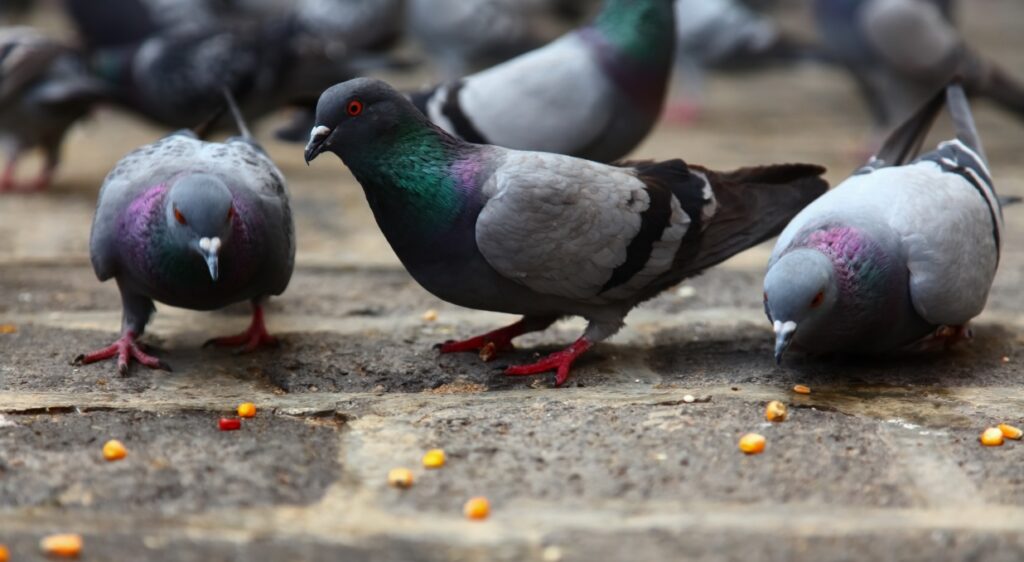Pigeons are small birds often found in urban areas. They make a distinctive cooing sound while roosting and are well-adapted to human environments. Pigeons can also be pests because they flock together in large groups, which can cause damage to buildings and crops.
The common name of pigeon typically refers to the feral rock pigeon found throughout urban and suburban areas worldwide. In the family Columbidae, feral pigeons are closely related to doves, such as the Mourning Dove and Collared Dove.
These social and omnivorous birds can travel long distances in large flocks to find food. They eat many different things, including seeds, fruits, vegetables, grains, insects, and seeds. All pigeons also need to eat grit or small rocks that aid their digestive process.
What Do Wild Pigeons Eat?
Wild pigeons live in many different habitats but prefer to live in areas where humans live. Their diet reflects the food available in the urban, suburban, and agricultural locations where humans have changed the landscape in many ways.
In urban areas, pigeons scavenge for food in trash and debris they find on the streets and outside restaurants. They occasionally steal food from people trying to eat outside, although many people feed them freely, encouraging these birds to look for food in these places.
Feral pigeons in suburban habitats often feed from bird feeders year-round, eating the seed blends and suet that people put in their feeders. In neighborhood gardens, pigeons often feed on fruits, vegetables, and plant matter, which can be a nuisance to homeowners.
Flocks of feral pigeons also live in rural agricultural areas, sometimes causing damage in the fields where they forage. Unlike in populated areas, however, people can hunt feral pigeons year-round in most of the United States to prevent damage to their crops.

What Do Domesticated Pigeons Eat?
Domesticated pigeons descended from rock doves bred by humans for thousands of years. Since their domestication began, they have been used as messengers, racing birds, and pets, and their bodies can contain many different colors and patterns.
People feed their domesticated pigeons a diet that varies depending on how the pigeons are used. Racing pigeons typically eat grains, seeds, and manufactured pigeon feed mixtures that depend on each bird’s age, health, and training regimen.
Common ingredients in racing pigeon feed include maize, wheat, oats, barley, millet, sorghum, soybean, vegetable oil, and added minerals and vitamins. Sometimes, pigeon trainers also feed their birds electrolytes and amino acids to boost their performance.
People who keep domesticated pigeons as pets may feed them various grains, seeds, and vegetables, including cracked corn, millet, safflower seed, wheat, lentils, hemp, sunflower, peas, and soybean.
What Do Young Pigeons Eat?
Adult pigeons feed their young, called squabs, pigeon milk, a nutrient-rich liquid produced by the parents’ crop glands. This crop milk provides squabs with a protein-rich diet during the critical first few weeks of growth.
After a few days, squabs continue to eat the crop milk but supplement their diet with seeds, grains, and insects. Within three weeks after hatching, most squabs have been weaned from crop milk and exclusively eat solid foods.
What Can Pigeons Not Eat?
While pigeons are omnivorous and can eat many things, there are some items that they should not eat, including chocolate, avocado, onions, garlic, alcohol, salty foods, caffeine, sugary foods, raw meat, and moldy food. These foods can make pigeons sick.
Pet pigeon owners should prevent their birds from ingesting these foods because they can cause digestive problems caused by gastrointestinal parasites that can decrease the lifespan of their birds.
What Do Pigeons Eat During Winter?
Food availability throughout the winter in the northern parts of the United States can make survival in cold climates challenging for feral pigeons. These birds build up their fat stores throughout the warm months when there is plenty of food and forage what they can in winter.
Pigeons may find a variety of foods in the winter, including seeds, berries, nuts, and insects; however, they must compete with other birds for these items. Many people provide suet and seeds for overwintering birds that help them survive the cold temperatures.
Urban and suburban pigeons also eat food scraps and garbage when they can find it. These adaptable birds can usually find food no matter where they live, even in the driest summers and coldest winters.
